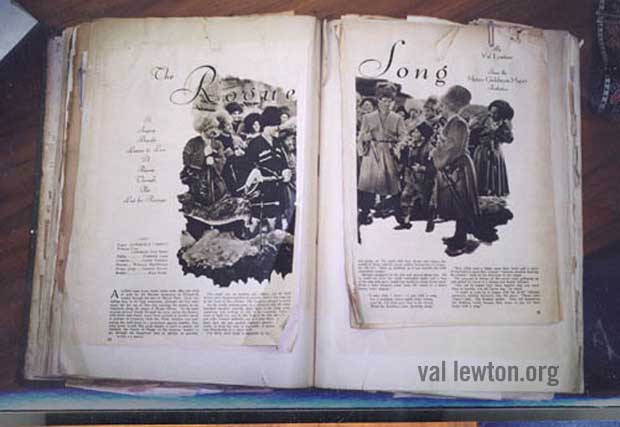Val Lewton.org
Val Lewton Papers | Scope and Content Notes
Val Lewton Papers : Manuscript Division
Library of Congress

[Above] From the scrapbook (Serialization magazine pages for Rogues Song)
Scope and Content Note from the Val Lewton Papers at the Library of Congress
The papers of Val Lewton (1904-1951) span the years 1924-1982, with the bulk of the items concentrated in the period 1926-1951. The collection contains film scripts, scrapbooks, and other material documenting Lewton's career as a novelist, screenwriter, and motion picture producer, and is arranged into family papers, writings, miscellany, and oversize materials.
Family papers, 1927-1982, n.d., include letters received by Lewton's wife Ruth, his sister Lucy Olga, his mother Nina, and his aunt, silent film actress Nazimova. His mother and aunt both influenced his choice of career and early contacts. In 1928 Nina Lewton, as head of the story department at Metro-Goldwyn-Mayer, got her son a job writing publicity for M-G-M, training him in story analysis and synopsis writing. In 1933 she was approached by David O. Selznick to discover a Russian-born writer who could do a script of Taras Bulba. Lewton was hired to do the treatment (never filmed) and moved to California, working as Selznick's story editor and assistant until 1942, when he was offered a position as head of the new horror unit at RKO Radio Pictures. Letters include Selznick's condolences on Lewton's death and a copy of a telegram of congratulations he sent on the success of Cat People. Also contained among the family papers are a family history and eulogies written for Lewton, his mother Nina, and aunt Nazimova, whose papers the Manuscript Division also holds. Nazimova, a silent film actress, employed her sister Nina during their passage to America and upon their arrival.
Writings, 1924-1946, n.d., and scrapbooks, 1927-1934, document the publicity practices of Hollywood studios of the era. The writings include scripts of three of Lewton's dramatized radio reviews and a serialization in the Daily Mirror of his best-known novel, No Bed of Her Own (1932), which told the story of a girl victimized by Depression poverty. Paramount Pictures bought the rights and produced the film No Man of Her Own, starring Clark Gable and Carole Lombard; related material is found in the scrapbooks.
Lewton left M-G-M in 1932 and Vanguard Press signed him to a contract producing five novels per year, several of which he wrote under the pseudonym Carlos Keith. Lewton's journals for 1933-1934 document his writing and domestic activities. Brief entries for 1937 record frustration with his “despised role of story editor-censor” and with his inability to return to his own writing. Lewton's writings are also found in the scrapbooks in the form of printed articles; news features, including several on Greta Garbo, some published under pseudonyms; and fiction, including novelizations and serializations of M-G-M feature films, most of which he wrote in various capacities during his years at M-G-M. A sampling of press releases, all dated 14 January 1929, are found with the scrapbooks. The scrapbooks also contain dust jackets, reviews, and other material relating to books written by Lewton.
Lewton's output as head of the horror unit of RKO is represented primarily in the writings by a bound set of final scripts of the eleven films he produced at that studio with directors Jacques Tourneur, Robert Wise, and Mark Robson, beginning with Cat People in 1942. These scripts were presented to him when his production unit was disbanded on his departure from RKO. Lewton contributed to the screenplays from the original story-lines through the various drafts and revisions. He wrote the final shooting scripts himself, although he took screen credit for writing only on The Body Snatcher and Bedlam, using his old pseudonym Carlos Keith. The writings also include journal entries for January-February 1946 touching on the reception of Bedlam; work on Blackbeard, an abandoned RKO project; and exploration of leaving that studio. An undated screenplay written with Mark Robson, “The Fact of Murder,” probably dates from these years as well.
Miscellaneous and oversize material in the collection, 1926-1973, n.d., includes a scrapbook largely containing reviews for the years 1942-1950, a cast photograph of My Own True Love, produced at Paramount Studios in 1947, and clippings related to Apache Drums, produced at Universal-International in 1950. Other material includes a typescript of the opening pages of Joel E. Siegel's biography, Val Lewton: The Reality of Terror, printed matter, such as film program books from 1926 and 1927, a four-page spread in Life magazine on Lewton's final RKO film, Bedlam, 1946, as “movie of the week,” other clippings and reviews, a poster promoting No Bed of Her Own, and the scrapbooks for the years 1927-1934. A group of forty-five photographs transferred to the Prints and Photographs Division include portraits of Lewton, family pictures with Nazimova and Nina and Ruth Lewton, a photograph of his mother's family, the Leventons, circa 1881, and of Lewton with associates Mark Robson, Robert Wise, and Verna de Mots.
Read the Library of Congress Timeline of Lewton's life
This information is mainly culled from the Library of Congress, Manuscript Division Reading Room page here.